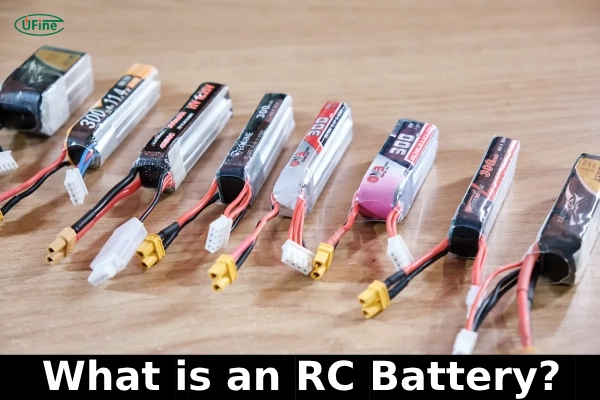Remote control (RC) vehicles have captivated enthusiasts for decades, from the elegant RC cars that race across dirt tracks to the robust RC airplanes soaring through the sky. At the heart of every RC vehicle’s performance lies a crucial component: the RC battery. Understanding the ins and outs of RC batteries is essential for anyone looking to get the most out of their RC experience. In this comprehensive guide, we’ll dive deep into RC batteries, their types, maintenance tips, and how to choose the right one for your needs.
Part 1. Types of RC batteries
RC batteries are the power source for remote-controlled vehicles, providing the necessary energy to run motors, servos, and other electronic components. With a reliable battery, your RC vehicle’s performance would remain protected, resulting in shorter run times and improved power. Next, learn about their types to make it easier to choose.
Nickel-Cadmium (NiCd) Batteries
Nickel-cadmium (NiCd) batteries were once the standard for RC vehicles. They are known for their durability and ability to deliver high-power outputs. However, they suffer from a disadvantage known as the “memory effect,” where the battery loses its maximum energy capacity if not entirely discharged before recharging.
Nickel-Metal Hydride (NiMH) Batteries
Due to their higher capacity and better environmental credentials, nickel-metal hydride (NiMH) batteries have largely replaced NiCd batteries. NiMH batteries are less susceptible to the memory effect, making them easier to maintain. They are a popular choice for many RC enthusiasts due to their balance of performance and cost.
Lithium-Polymer (LiPo) Batteries
Lithium-polymer (LiPo) batteries are the gold standard in RC battery technology. They offer superior energy density, meaning they can store more energy in a smaller, lighter package. LiPo batteries provide high discharge rates, leading to better performance and longer run times. However, they require careful handling and specific charging equipment to avoid potential safety hazards.
Lithium-ion (Li-Ion) Batteries
Lithium-ion (Li-Ion) batteries are similar to LiPo batteries but are more stable and generally safer. They have a slightly lower discharge rate but offer a longer lifespan. People often use Li-Ion batteries in applications, prioritizing safety and longevity over the highest possible performance.
Part 2. Understanding RC battery specifications
Voltage
Voltage is a measure of the electrical potential provided by the battery. Higher voltage batteries can deliver more power, translating to higher speeds and better performance for your RC vehicle.
Capacity (mAh)
Capacity, measured in milliampere-hours (mAh), indicates how much energy a battery can store. A higher capacity means longer run times. For example, a battery rated at 5000mAh can deliver 5000 milliamps for one hour.
Discharge Rate (C Rating)
The discharge rate, or C rating, indicates how quickly a battery can safely discharge. A higher C rating means the battery can deliver more power quickly, which is crucial for high-performance RC applications.
Part 3. How to choose the right RC battery?
Match the Voltage
Ensure that the battery matches the voltage your RC vehicle is designed to handle. Using a battery with too high a voltage can damage your electronics. At the same time, voltages that are too low can lead to poor performance.
Consider the Capacity
Choose a battery with a capacity that meets your needs. Higher capacity batteries will give you longer run times but may be larger and heavier.
Check the Discharge Rate
Select a battery with a C rating suitable for your vehicle’s requirements. High-performance models will need batteries with higher C ratings to provide the necessary power.
Size and Weight
Make sure the battery fits within the designated compartment of your RC vehicle. Also, consider the weight, as heavier batteries can affect the balance and handling of your car.
Part 4. Charging and maintaining RC batteries
Proper Charging Practices
Use a charger that is compatible with your battery type. For example, LiPo batteries require special chargers that can balance the individual cells within the pack. Never leave batteries unattended while charging; always charge in a safe, fire-resistant location.
Storage Tips
Store batteries at a partial charge (around 50-60%) if you won’t use them for an extended period. Avoid storing batteries in extreme temperatures, which can degrade their performance and lifespan.
Handling and Safety
Handle batteries with care to avoid punctures or physical damage. Never short-circuit the terminals, and safely dispose of damaged or swollen batteries, following local regulations.
Part 5. Extending the lifespan of your RC batteries
Avoid Over-Discharging
Over-discharging can severely damage your battery and reduce its lifespan. To prevent this, use an electronic speed controller (ESC) with a low voltage cutoff. For LiPo batteries, never let the voltage drop below 3.0V per cell.
Balance Charging
Using a balance charger for multi-cell batteries ensures equal charging of each cell. This practice helps maintain the battery’s health and prevents issues related to cell imbalance.
Regular Cycling
Regular cycling (fully discharging and recharging) can help maintain their performance for NiCd and NiMH batteries. However, avoid overdoing this with LiPo batteries, as it can cause more harm than good.
Part 6. Common issues and troubleshooting RC battery
Swollen Batteries
Swelling is a common issue with LiPo batteries and can indicate internal damage or overcharging. If you notice a swollen battery, discontinue use immediately and dispose of it safely.
Reduced Performance
If your battery isn’t holding a charge or your RC vehicle’s performance has declined, it might be due to aging cells or improper maintenance. Regularly check your batteries and replace them when necessary.
Heat Issues
Excessive heat can damage your battery and reduce its lifespan. Ensure proper ventilation for your RC vehicle’s battery compartment and avoid overloading the battery with high discharge demands.
Part 7. FAQs
-
Can I Mix Different Battery Types?
It’s generally not recommended to mix different battery types (e.g., NiMH and LiPo) in the exact RC vehicle due to differing voltage characteristics and charging requirements. -
How Often Should I Replace My RC Battery?
The lifespan of an RC battery varies depending on usage and maintenance. On average, a well-maintained battery can last for several hundred charge cycles. Replace batteries if they show signs of damage, swelling, or significantly reduced performance. -
Is It Safe to Leave Batteries in the RC Vehicle?
If you are removing batteries from your RC vehicle when they are not in use, that is best. This practice prevents accidental discharge and potential battery and car damage. -
How long will the RC battery last?
An RC battery’s lifespan depends on several factors. Typically, a well-maintained battery lasts 300-500 charge cycles. This means you can recharge it 300 to 500 times before it starts losing capacity.
Related Tags:
More Articles

How to Choose the Right Electric Fence Battery?
Choosing the right electric fence battery is key to security. This guide helps you pick a reliable farm, garden, or animal power source.
What Are Lithium Pouch Cells?
Explore how lithium pouch cells work, their structure, advantages, and uses. Learn from a trusted supplier like Ufine Battery for custom lithium solutions.
The Evolution of Ring Battery Pack Technology in Lithium Battery Manufacturing
Ring battery packs are reshaping lithium battery tech. Discover their evolution, key uses, and why they matter for the future of energy storage.
Lithium vs Lithium Salt: What’s the Difference?
Lithium is a pure metal, while lithium salts are stable battery compounds. Learn their key roles and differences in battery manufacturing.
What You Need to Know About AA 3.6V Lithium Battery
Learn all about AA 3.6V lithium batteries—voltage, size, capacity, uses, and the best replacements. Discover why they’re powerful, and highly reliable.




